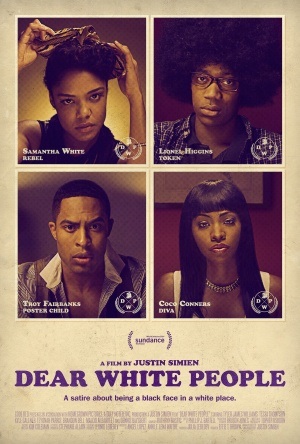CIFF Review: Dear White People



Dear White People was one of my Sundance picks way back in January, and man did it live up to the hype. The feature film debut of writer/director Justin Simien, Dear White People follows a group of students at a Harvard-esque Ivy League school, the fictional Winchester, as they struggle with their identities. Yes, race makes up a large part of that struggle, but to say the movie is just about race is reductive. It’s about how gender, class, sexuality, generation, and politics intersect with race, and how all of these different facets combine to determine who we are. It’s a very funny movie, but one that also contains some bitter pills.
Simien’s script is very smart. Every once in a while a line of dialogue falls flat, usually when someone states the obvious instead of letting the audience get there on their own, but it’s not preachy nor does it talk down to the audience. Simien has created a group of very believable characters, no one wholly perfect nor totally despicable. And the campus setting provides the perfect closed environment for the social politics of the film. The white school administrator insists they “don’t have an intolerance problem”, meanwhile, his own son is bullying the gay black kid who lives in his otherwise all-white dorm, and they all have to deal with each other because no one is dropping out of school.
These kinds of conflicts populate the film. Sam, the protagonist who does the “Dear white people” bit, has a similarly politically-motivated boyfriend within the black community on campus, but she’s involved in a torrid romance with her white TA. Coco desperately wants to fit in with the uber-privileged country club types of “Bechet House”, but only gets an in when she plays into a “Real Housewives” perception. Despite his afro, Lionel doesn’t feel he fits in anywhere because he doesn’t identify with black culture. Wisely, Simien doesn’t try to resolve every conflict. Identity is treated as a puzzle, and by the end of the movie, some characters have assembled more of their puzzle than others, but all of them still have pieces that don’t quite fit together.
There is some first-time director gobbledygook, though, particularly with overly precious camerawork. If we don’t NEED to see a scene from that weird angle, then why are we looking at a scene from that weird angle? But that’s really the only technical issue there is, and it’s a pretty minor blemish on an otherwise sharp satire stick that Simien wields with skill. This is a very confident debut film, especially in its scripting. And Simien shows a knack for handling actors, getting strong performances from his entire cast.
Everyone will laugh at different things in Dear White People, and everyone will wince at different things. This is a great movie to see in a big group—you’ll want to talk about it as soon as it’s over. Really funny and occasionally painful, it perfectly captures the state of race relations in so-called “post-racial” America. It’s a great entry point into a serious conversation that we really ought to be having in a more constructive way.
